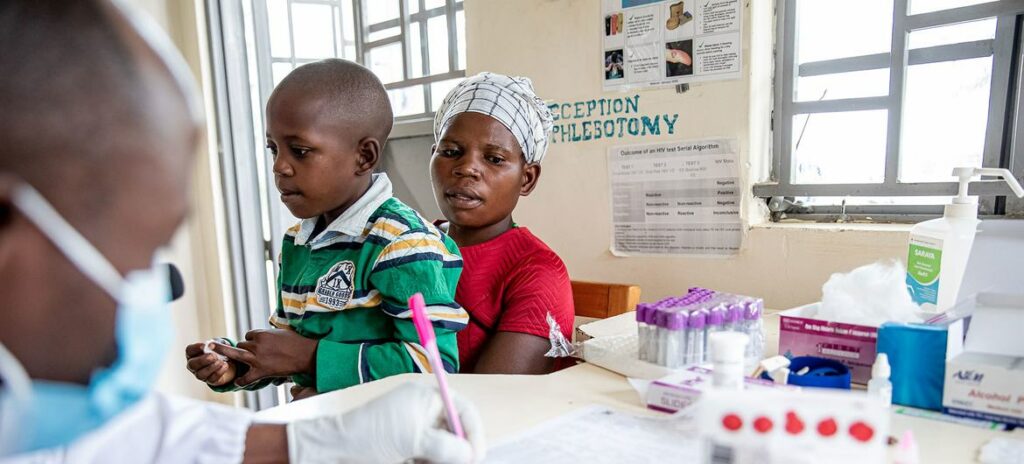Six million new HIV infections and four million additional AIDS-related deaths could occur between 2025 and 2029 if U.S.-supported HIV treatment and prevention services collapse completely, a United Nations agency warned on Thursday, highlighting that such cuts threaten to undo over two decades of progress in the fight against the AIDS pandemic.
According to the head of UNAIDS, this is not just a funding gap—it’s a ticking time bomb.
“We have seen services vanish overnight. Health workers sent home. And people—especially children and key populations—excluded from care,” said Winnie Byanyima, Executive Director of UNAIDS, during the release of the agency’s 2025 Global AIDS Update.
Disruption of U.S. Aid
In April, UNAIDS had already evaluated the consequences of a permanent interruption of the U.S. President’s Emergency Plan for AIDS Relief (PEPFAR), estimating that it would result in over six million new infections and 4.2 million AIDS-related deaths in just four years, pushing the pandemic back to levels not seen since the early 2000s.
In 2025, PEPFAR committed $4.3 billion in bilateral aid. The program supported HIV testing for 84.1 million people and treatment for 20.6 million people, and enabled 2.3 million adolescent girls and young women to access comprehensive HIV prevention services in 2024.
Roughly 31.6 million people were receiving antiretroviral treatment in 2024, and AIDS-related deaths had been reduced by more than half compared to 2010, the UN report recalled, reigniting concerns about the sustainability of prevention and treatment programs.
Prevention Programs Severely Affected
Meanwhile, disruptions are affecting the entire HIV response.
In Mozambique, more than 30,000 health workers have lost their jobs. In Nigeria, the number of people starting pre-exposure prophylaxis (PrEP) dropped from 40,000 to 6,000 per month.
However, prevention efforts were already faltering before the withdrawal of U.S. aid. In 2024, there were 1.3 million new infections, nearly the same as the previous year. More than 210,000 girls and young women aged 15 to 24 contracted HIV in 2024—an average of 570 new infections per day, according to UNAIDS.
In 2024, 630,000 people died from AIDS-related causes, 61% of them in sub-Saharan Africa.
“Community-led services, which are essential for reaching marginalized populations, are being dismantled at an alarming rate,” UNAIDS noted.
By early 2025, over 60% of women-led HIV organizations surveyed had lost funding or been forced to suspend services.
Examples of Resilience in Africa
Despite this bleak outlook, the report also highlights examples of resilience, with countries and communities confronting adversity to preserve gains and move the HIV response forward.
Only 25 out of 60 low- and middle-income countries in the report increased their national HIV budgets for 2026. The average increase was 8%, representing around $180 million in additional domestic resources.
South Africa currently funds 77% of its AIDS response, and its 2025 budget review includes a planned 5.9% annual increase in health spending over the next three years, including a 3.3% annual increase for HIV and TB programs.
Call for Solidarity
For the Geneva-based UN agency, these steps could mark “the beginnings of a new economic settlement that gives countries the fiscal space to invest in the global HIV response,” according to UNAIDS.
Still, urgent action and renewed global solidarity are needed to sustain progress and prevent a resurgence of HIV.
“In times of crisis, the world must choose transformation over retreat,” said Ms. Byanyima.
“Together, we can still end AIDS as a public health threat by 2030—if we act urgently, united, and with unwavering commitment.”
The UNAIDS report was released ahead of the IAS 2025 Scientific Conference on HIV/AIDS, which will be held in Kigali, Rwanda, from July 13 to 17, 2025.







OTHER ARTICLES
Editorial — Prevent, inform, and act for women’s health in Africa
Kenya : Government Prioritises Maternal Health and Strengthens Support for Community Health Promoters
Strengthening pandemic prevention, preparedness, and response capacities in Senegal using the “One Health” approach